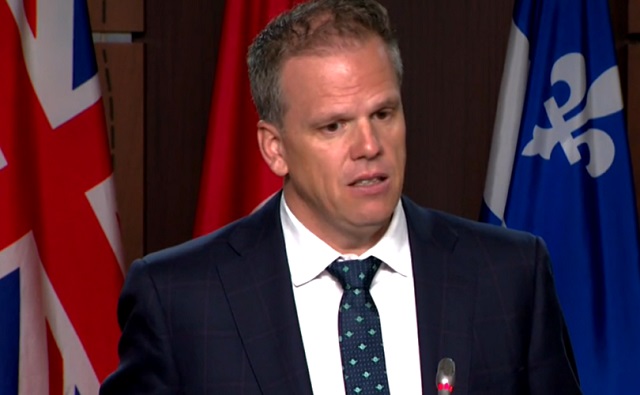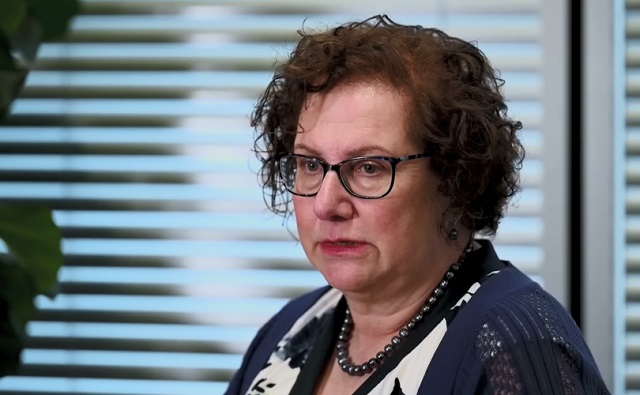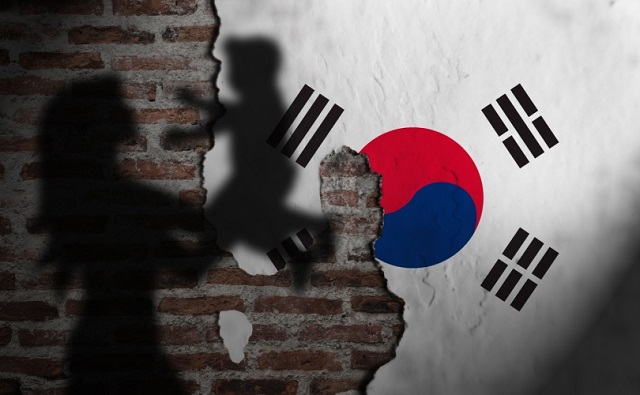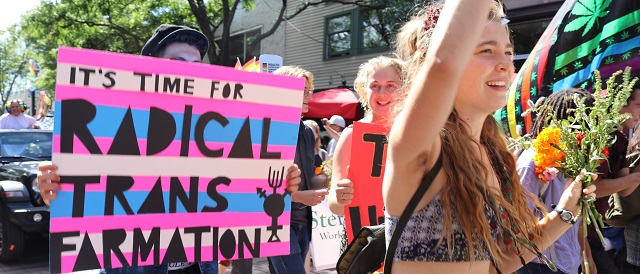Health
Canadian provinces push back after Trudeau’s health minister says MAiD will eventually be expanded

Liberal Health Minister Mark Holland
From LifeSiteNews
Holland has told Canadians that the government, is still seeking to expand MAiD (Medical Assistance in Dying) to those suffering from mental health issues; it just needs more time to prepare the ‘system.’
The Trudeau government still intends to provide euthanasia to mentally ill Canadians, but provincial health ministers are asking for the measure to be “indefinitely” postponed.
On January 30, health ministers from Ontario, Alberta, New Brunswick, Nova Scotia, Saskatchewan, Prince Edward Island, British Columbia, Yukon, Northwest Territories, and Nunavut appealed to Liberal Health Minister Mark Holland to “indefinitely pause” expanding MAiD eligibility to the mentally ill.
Health ministers from ON, AB, NB, NS, SK, PEI, BC, Yukon, NWT, and Nunavut are calling on Ottawa to "indefinitely pause" expanding MAID eligibility to mental illness.
Concerns about a consistent and safe approach, time for training, and an expected jump in patients#CdnPoli pic.twitter.com/1Hh4oJfsER
— Colton Praill (@ColtonPraill) January 30, 2024
On January 29, Holland told Canadians that the Liberal government, under the leadership of Prime Minister Justin Trudeau, is still seeking to expand MAiD (Medical Assistance in Dying) to those suffering from mental health issues; it just needs more time to prepare the “system.”
“We agree with the conclusion that the committee has come to that the system is not ready, and more time is required,” Holland told reporters, referring to a report that “fundamental issues” regarding the expansion have yet to be resolved.
Trudeau's health minister says "the system is at this time not ready and more time is required" to expand MAiD to those for whom mental illness is "the sole underlying condition" pic.twitter.com/Z4hYcduaWh
— The Post Millennial (@TPostMillennial) January 29, 2024
The new provision, which was to take effect in March, would have relaxed legislation around so-called MAiD to include those suffering solely from mental illness. This is a result of the 2021 passage of Bill C-7, which also allowed the chronically ill – not just the terminally ill – to qualify for so-called doctor-assisted death.
On Monday, following pushback from Canadians, Holland announced that Canada is not ready for the expansion and has determined to delay it. However, Holland stressed that this is not an abandonment of the new policy but merely a postponement.
“There are people who have, for decades, been trapped in mental torture, being in a horrific situation where they have tried everything and exhausted all avenues and under their own recognisance are saying that they want access to MAiD,” he claimed.
“What we’re saying is that … someone in that intractable situation … should have that right, but the system needs to be ready, and the system needs to get it right,” he added, not explaining how being killed would help their situation.
Holland did not reveal when the expansion is expected to take effect but disclosed that “those individuals are gonna have to wait a little longer” to end their lives by lethal injection.
Reporter: "Is your intention to still move ahead with MAiD for mental illness, just within a longer timeframe?"
Trudeau's health minister: "That's correct." pic.twitter.com/XzGs7QoexU
— The Post Millennial (@TPostMillennial) January 29, 2024
The Liberal government’s desire to expand MAiD to those suffering with mental health issues comes despite several experts, and provincial health ministers, warning against the move.
RELATED: Canada’s top pro-life group urges Trudeau gov’t to drop euthanasia expansion entirely
The provincial health ministers’ appeal echoes that of leading Canadian psychiatrist Dr. K. Sonu Gaind, who testified that the expansion of MAiD “is not so much a slippery slope as a runaway train.”
Similarly, in November, several Canadian psychiatrists warned that the country is “not ready” for the coming expansion of euthanasia to those who are mentally ill. They said that further liberalizing the procedure is not something that “society should be doing” as it could lead to deaths under a “false pretence.”
The expansion of euthanasia to those with mental illness even has the far-left New Democratic Party (NDP) concerned. Dismissing these concerns, a Trudeau Foundation fellow actually said Trudeau’s current euthanasia regime is marked by “privilege,” assuring the Canadian people that most of those being put to death are “white,” “well off,” and “highly educated.”
The most recent reports show that MAiD is the sixth highest cause of death. However, it was not listed as such in Statistics Canada’stop 10 leading causes of death from 2019 to 2022. When asked why MAiD was left off the list, the agency explained that it records the illnesses that led Canadians to choose to end their lives via euthanasia, not the actual cause of death, as the primary cause of death.
According to Health Canada, in 2022, 13,241 Canadians died by MAiD lethal injections. This accounts for 4.1 percent of all deaths in the country for that year,a 31.2 percent increase from 2021.
While the numbers for 2023 have yet to be released, all indications point to a situation even more grim than 2022.
Meanwhile, the pro-life Euthanasia Prevention Coalition (EPC)has launched a campaign to have the expansion thrown out. The campaign includes a rally and media conference on Parliament Hill on February 6 at 11 a.m. local time.
The movement also features a parliamentary postcard campaign, encouraging Canadians to send letters stating: “I demand that the government reverse its decision to permit ‘MAiD’ for mental illness alone.”
EPC also launched a petition to urge the Justice Minister to offer real care to those suffering from mental illness and not death by lethal injection.
Health
UK pediatrician who led review of child ‘transitions’ says US medical groups ‘misleading the public’

Dr. Hilary Cass, author of the Cass Review
From LifeSiteNews
The American Academy of Pediatrics’ support for surgically and chemically mutilating gender-confused children ‘is now demonstrated to be out of date by multiple systematic reviews,’ Dr. Hilary Cass told the New York Times.
The typically left-wing New York Times published an interview on Monday with consultant pediatrician Dr. Hilary Cass on her comprehensive review of so-called “gender medicine” in the United Kingdom, indicating that awareness of the damage due to surgical and chemical “transitioning” continues to spread despite the best efforts of LGBT activists.
Released in April, 366-page Cass Review was commissioned by National Health Service (NHS) England following ongoing scandals about the practices of British “gender clinics” such as the Gender Identity Development Service (GIDS), operated by the Tavistock and Portman NHS Foundation Trust. The four-year project consisted of comprehensive reviews of current research and international standards, as well as extensive interviews with gender-confused children and adults, family members, detransitioners, doctors, and activists.
It found that “gender medicine” is “built on shaky foundations” and that while such interventions require a great deal of caution, “quite the reverse happened in the field of [so-called] gender care for children,” and that “[w]hile a considerable amount of research has been published in this field, systematic evidence reviews demonstrated the poor quality of the published studies, meaning there is not a reliable evidence base upon which to make clinical decisions, or for children and their families to make informed choices.” Her findings led NHS to stop prescribing puberty blockers to children with gender confusion earlier this year.
Speaking to the Times, Cass explained that she was planning her retirement when she was first asked to tackle the project and was initially apprehensive about wading into the controversy.
“The most important concern for me is just how poor the evidence base is in this area,” she said. “Some people have questioned, ‘Did we set a higher bar for this group of young people?’ We absolutely didn’t. The real problem is that the evidence is very weak compared to many other areas of pediatric practice.”
The Times acknowledged that her “findings are in line with several European countries that have limited the treatments [sic] after scientific reviews. But in America, where nearly two dozen states have banned the care outright, medical groups have endorsed the treatments as evidence-based and necessary,” including groups the paper contacted for its latest story. Cass described American medical consensus as “out of date” on the issue.
“When I was president of the Royal College of Pediatrics and Child Health, we did some great work with the A.A.P. [American Academy of Pediatrics],” she elaborated. “They are an organization that I have enormous respect for. But I respectfully disagree with them on holding on to a position that is now demonstrated to be out of date by multiple systematic reviews.”
“It wouldn’t be too much of a problem if people were saying ‘This is clinical consensus and we’re not sure,” she added. “But what some organizations are doing is doubling down on saying the evidence is good. And I think that’s where you’re misleading the public. You need to be honest about the strength of the evidence and say what you’re going to do to improve it.”
A significant body of evidence shows that “affirming” gender confusion carries serious harms, especially when done with impressionable children who lack the mental development, emotional maturity, and life experience to consider the long-term ramifications of the decisions being pushed on them.
Studies find that more than 80% of children experiencing gender dysphoria outgrow it on their own by late adolescence, and that even full “reassignment” surgery often fails to resolve gender-confused individuals’ heightened tendency to engage in self-harm and suicide — and may even exacerbate it, including by reinforcing their confusion and neglecting the actual root causes of their mental strife.
Yet while mounting evidence against youth “gender transitions” is prompting European nations such as the United Kingdom and France, which are normally to the left of America, to move away from the practice, in America, the medical establishment and the Biden administration continues to dig in their heels, despite Biden’s own Substance Abuse & Mental Health Services Administration (SAMHSA) releasing a since-deleted report last year acknowledging that “lesbian, gay, and bisexual adults are more likely than straight adults to use substances, experience mental health conditions including major depressive episodes, and experience serious thoughts of suicide.”
The White House’s comprehensive pursuit of the transgender agenda has included reopening the military to recruits afflicted with gender dysphoria, promoting gender ideology within the military (including “diversity” and drag events on military bases), holding White House events to “affirm transgender kids,” condemning state laws against underage “transitions” as “close to sinful,” promoting underage “transitions” (potentially at taxpayer expense) as a “best practice,” and trying to force federally funded schools to let males into female athletic competitions and restrooms.
Health
South Korean president declares low birth rate a ‘national emergency,’ plans new ministry to address it

From LifeSiteNews
President Yoon Suk Yeol announced that he would ask for the parliament’s support to establish a new Ministry of Low Birth Rate Counter Planning after the country reached a new low with an average number of babies per woman of 0.72 in 2023.
South Korea’s president has declared the country’s low birth rate a “national emergency” and announced a new government ministry to address the problem.
In a televised press conference on May 9, President Yoon Suk Yeol said, “We will mobilize all of the nation’s capabilities to overcome the low birth rate, which can be considered a national emergency.”
He announced he would ask for the parliament’s support to establish a new “Ministry of Low Birth Rate Counter Planning.”
South Korea has had the lowest fertility rate in the world for years, and the average number of babies per woman dropped to a new low of 0.72 in 2023, down from 0.78 the previous year.
Despite the government’s efforts to increase the birth rate by spending over $200 billion on initiatives meant to encourage larger families, including infertility treatment, cash subsidies, and childcare services, the country’s birth rate declined for the fourth year in a row in 2023.
A Korean Construction corporation made headlines this year for offering employees $75,000 for each baby they have. “If Korea’s birth rate remains low, the country will face extinction,” Lee Joong-keun, chairman of the Booyoung Group, warned.
READ: New ‘Birthgap’ film shows how explosion in childlessness is driving population collapse
According to YouTuber Stephan Park, who grew up in South Korea and runs the YouTube channel Asian Boss, Korean men face the additional problem of being expected to own a house when they marry, which is very difficult under the country’s current economic conditions.
“There are all the societal pressures that if you get married, guys are the ones that are supposed to buy the house, to have the house ready, which is impossible to have if you are a 30-year-old guy … with the average house prices you’ll never be able to afford one in your lifetime,” Park explained.
“So that’s the most common thing we hear: ‘I cannot afford to get married,’” he added.
According to some projections, South Korea’s and multiple other Western and Asian populations are expected to be cut in half by the year 2100 if the current trends continue.
-

 City of Red Deer2 days ago
City of Red Deer2 days agoCity Council paving the way for more house suites, backyard suites, tiny homes, and duplexes
-

 Uncategorized1 day ago
Uncategorized1 day agoRCMP recruitment failure has Alberta advocacy group calling for Provincial Police Service
-

 Opinion2 days ago
Opinion2 days agoCanada’s fertility, marriage rates plummet to record lows: report
-

 Automotive7 hours ago
Automotive7 hours agoGovernments in Canada accelerate EV ‘investments’ as automakers reverse course
-

 COVID-1918 hours ago
COVID-1918 hours agoJapan’s most senior cancer doctor: COVID shots are ‘essentially murder’
-

 Health1 day ago
Health1 day agoPrivate Footage Reveals Leading Medical Org’s Efforts To ‘Normalize’ Gender Ideology
-

 Health1 day ago
Health1 day agoTHE WPATH TAPES: Behind-The-Scenes Recordings Reveal What Top Gender Doctors Really Think About Sex Change Procedures
-

 illegal immigration2 days ago
illegal immigration2 days agoPanama’s Incoming President Wants To Shut Down His Country’s Most Treacherous Route For Migrants — But Will It Work?






